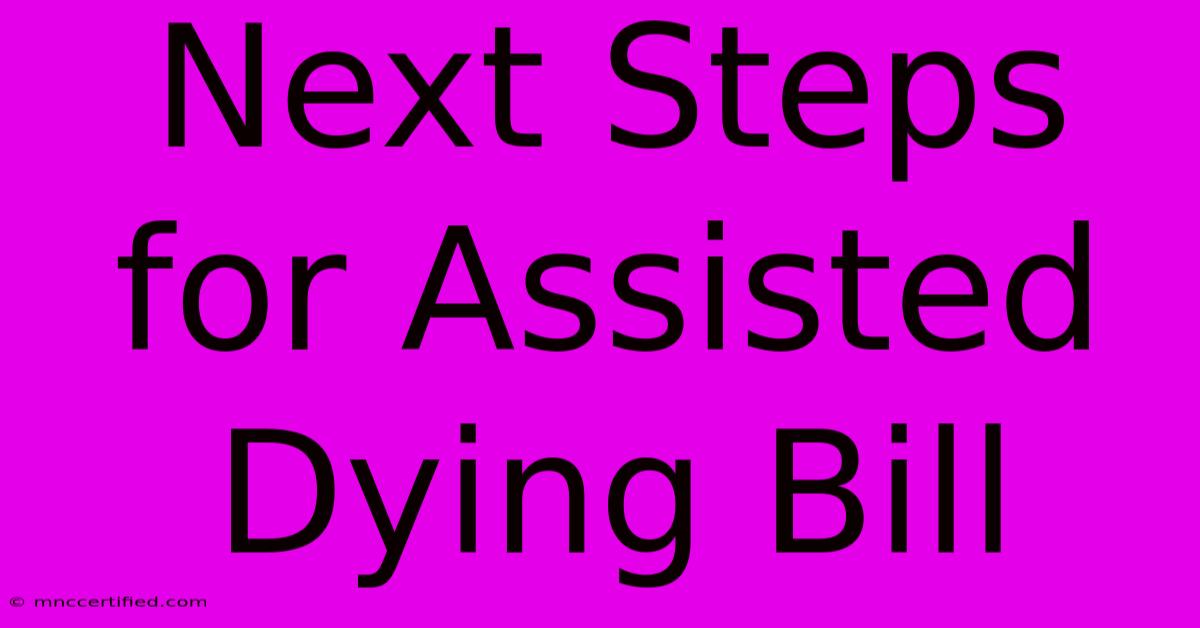Next Steps For Assisted Dying Bill

Table of Contents
Next Steps for Assisted Dying Legislation: A Complex Path Forward
The debate surrounding assisted dying, or medical aid in dying (MAID), continues to evolve globally. While some jurisdictions have legalized it, many others are still grappling with the ethical, legal, and practical implications. This article explores the next steps in the journey towards wider acceptance and responsible implementation of assisted dying legislation.
Understanding the Current Landscape
The legal status of assisted dying varies dramatically across the world. Some countries, like Canada and parts of Australia, have relatively broad legislation. Others, such as the Netherlands and Belgium, have had laws in place for a longer time, allowing for a more detailed analysis of their impact. Meanwhile, many countries maintain complete prohibitions, often citing concerns about patient autonomy versus protection of vulnerable populations. These differing approaches highlight the complexity of the issue and the need for careful consideration of the potential consequences of legalization.
Key Areas Requiring Further Consideration
Even in jurisdictions where assisted dying is legal, ongoing discussions and refinements are necessary. Key areas that require further attention include:
-
Eligibility Criteria: Defining precise criteria for eligibility is crucial to prevent abuse and ensure that only those with genuine, irreversible suffering have access to MAID. Discussions often revolve around the appropriate definition of "incurable illness" and the role of mental illness in eligibility considerations. The balance between patient autonomy and protection from coercion needs careful consideration. Strict safeguards and rigorous oversight are necessary components of responsible legislation.
-
Safeguarding Vulnerable Populations: Protecting vulnerable groups, including the elderly, disabled, and those experiencing mental health challenges, is paramount. Legislation must include provisions to ensure that individuals are not pressured into choosing assisted dying due to societal pressures, lack of access to adequate care, or inadequate support systems. Independent assessments and multiple consultations are often advocated for as essential protective measures.
-
Physician and Healthcare Professional Involvement: Addressing the concerns of healthcare professionals is vital. Many physicians have strong ethical objections to participating in assisted dying. Legislation should respect their conscientious objections while ensuring that patients who meet eligibility criteria have access to the procedure if they choose. Provisions for referral to other practitioners who are willing to participate are crucial.
-
Access and Equity: Ensuring equitable access to assisted dying for all eligible individuals, regardless of their socioeconomic status or geographic location, is essential. Addressing potential disparities in access based on factors such as income, insurance coverage, and proximity to healthcare providers is a critical consideration.
-
Ongoing Research and Monitoring: Continuous research and monitoring of the impact of assisted dying legislation are vital. Data collection on usage patterns, patient experiences, and potential unintended consequences should be rigorously implemented to inform future policy adjustments and ensure responsible implementation. Transparency and public reporting are necessary for accountability.
The Path Forward: Next Steps in Policy Development
Moving forward, the following steps are crucial for jurisdictions considering or refining assisted dying legislation:
-
Broad Public Consultation: Engaging in thorough and inclusive public consultations is essential to understand diverse perspectives and concerns within the community. This should include input from individuals with lived experience, healthcare professionals, ethicists, religious leaders, and disability rights advocates.
-
Robust Ethical Frameworks: Developing robust ethical frameworks, grounded in principles of autonomy, beneficence, non-maleficence, and justice, is paramount. These frameworks should provide clear guidelines for decision-making and address potential ethical dilemmas.
-
Comprehensive Training Programs: Providing comprehensive training for healthcare professionals involved in the process is vital to ensure appropriate care and adherence to legal and ethical standards.
-
Independent Oversight Bodies: Establishing independent oversight bodies to monitor implementation, investigate potential abuses, and make recommendations for improvements is essential for accountability and transparency.
Conclusion: A Balancing Act
The journey towards responsible and ethical assisted dying legislation is a complex and nuanced one. It requires careful balancing of patient autonomy, protection of vulnerable populations, and the ethical considerations of healthcare professionals. By prioritizing careful planning, broad public engagement, and robust oversight mechanisms, jurisdictions can strive towards a framework that respects individual choice while minimizing potential risks and unintended consequences. The ongoing dialogue and continuous evaluation of the impact of such legislation are indispensable for ensuring a just and compassionate approach to end-of-life care.

Thank you for visiting our website wich cover about Next Steps For Assisted Dying Bill. We hope the information provided has been useful to you. Feel free to contact us if you have any questions or need further assistance. See you next time and dont miss to bookmark.
Featured Posts
-
Bonded Title Procedure Texas
Nov 30, 2024
-
Assisted Dying Bill Advances In Parliament
Nov 30, 2024
-
Bottled In Bond Whiskey List
Nov 30, 2024
-
Georgia Football Score Prediction Georgia Tech Game
Nov 30, 2024
-
Iowa Vs Nebraska Husker Maxs Season Prediction
Nov 30, 2024